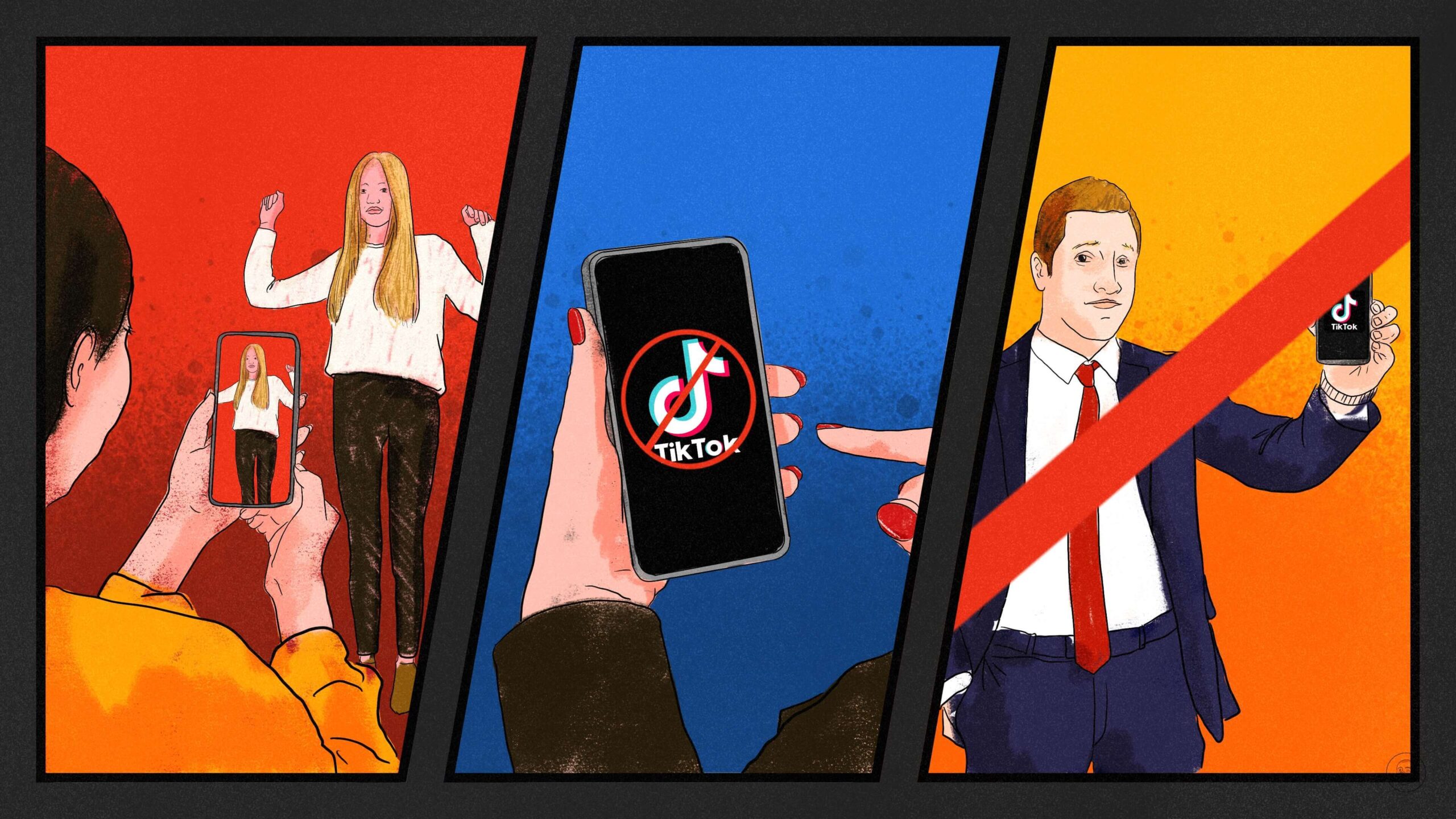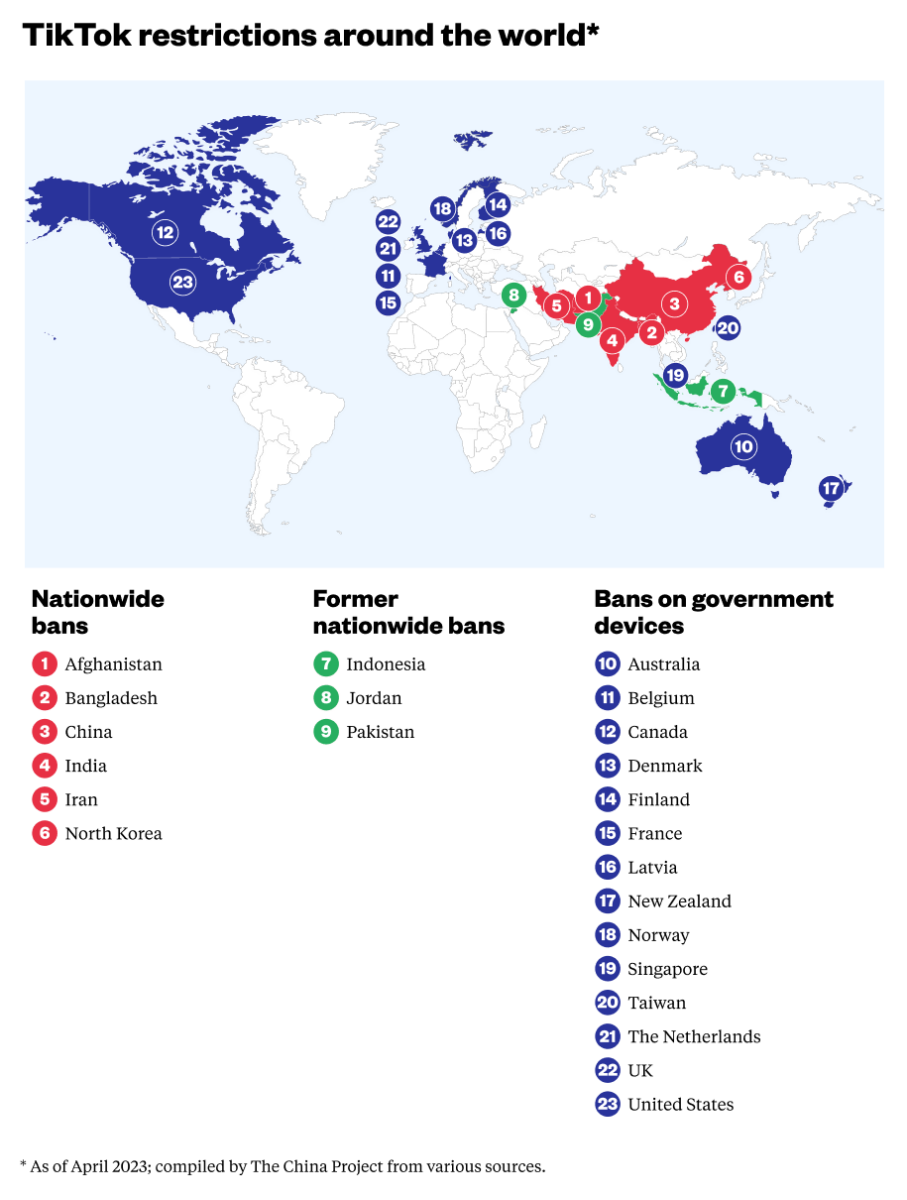A guide to TikTok bans around the world
Montana has just passed a TikTok ban, following a number of American federal and state restrictions on the short-video app. This is what you need to know about the new Montana law and other restrictions on the app around the world.

On Friday April 14, lawmakers in the U.S. state of Montana, which has a population just over 1 million, voted 54-43 to approve a ban on TikTok.
The Montana Senate Bill SB 419 prohibits mobile app stores from offering TikTok for download to users in the state, and would subject Apple and Google, which control the two main app stores, to fines of up to $10,000 for each violation of the ban.
The bill still needs to be signed by Montana’s Republican governor, Greg Gianforte, to come into effect, and it does not specify how the state government would enforce the ban. But Gianforte is “expected to sign the new sweeping restriction into law,” writes Dexter Tiff Roberts, former China bureau chief and Asia News Editor at Bloomberg Businessweek, and author in his Trade War newsletter.
Roberts is a Montana native, and currently teaches political science at the University of Montana, where he directs the China program at the Mansfield Center. He told the China Project the TikTok ban “could go all the way to the Supreme Court” because it may not be legally defensible.
But he says there is likely to be strong support for the ban in Montana where the state constitution indicates that the “right of individual privacy is essential to the well-being of a free society and shall not be infringed without the showing of a compelling state interest.” Montanans can be “serious about privacy,” says Roberts, and the TikTok bill “got a boost” because the Chinese balloon was first spotted by members of the public flying over the state. The balloon hoopla is intensifying local concerns about possible Chinese Communist Party espionage and surveillance.
Aside from the espionage and privacy concerns, the bill also emphasizes that “TikTok fails to remove, and may even promote, dangerous content that directs minors to engage in dangerous activities, including but not limited to throwing objects at moving automobiles…cooking chicken in NyQuil…smearing human feces on toddlers, [and] licking doorknobs and toilet seats to place oneself at risk of contracting coronavirus.”
Roberts says the “governor is expected to sign the new sweeping restriction into law.”
TikTok plans to fight back. The company has hired lobbyists in Helena, Montana’s state capital, and is featuring Montana TikTok users in media advertising in the state. “We will continue to fight for TikTok users and creators in Montana whose livelihoods and First Amendment rights are threatened by this egregious government overreach,” a spokesperson told the Wall Street Journal.
China news, weekly.
Sign up for The China Project’s weekly newsletter, our free roundup of the most important China stories.
Global worries
It’s not just Montana. TikTok is increasingly being seen as a problem around the world, thanks mostly to the fact that its parent company, ByteDance, is Chinese, and to its extraordinary popularity: it has more than 1.53 billion users across 150 countries. Close to a third of the world’s online population use the app.

Parents and legislators also worry about addiction to the app, negative effects on user behavior and psychology, privacy and cybersecurity, and the possibility of potential disinformation campaigns at the behest of the Chinese Communist Party.
To date, very few countries have imposed a nationwide ban of the app, and none have banned TikTok without also banning other consumer-facing platforms. But despite pressures seemingly mounting for the app, its parent company ByteDance is yet to feel serious damage to its bottom line.
ByteDance boasted its best ever underlying profit in 2022, which saw it outstrip both Tencent and Alibaba, China’s two historic tech giants. ByteDance’s sales were up more than 30% on the previous year, at almost $85 billion. And even though TikTok was lossmaking, this is not necessarily indicative of the app’s long-term potential — TikTok is still growing its user base around the world.
Given that 80% of ByteDance’s revenue comes from within China, the various restrictions that have been mooted for the company’s overseas offering would not irreparably damage the company’s finances, though it would impact future expansion beyond China’s borders. And in any case, further widespread restrictions are still a long way off, despite the moral panic on display in Washington D.C.
The early bans in south and west Asia
The most high-profile and sweeping ban to date came on June 29 2020, when the Indian government blocked TikTok from operating in the country, along with 58 other Chinese apps. As Graham Webster, a research scholar who leads Stanford University’s DigiChina Project, told the China Project, “TikTok was banned along with a large number of other Chinese apps in a basically retaliatory action,” following clashes between Chinese and Indian troops along their shared border. “It’s pretty reasonable to see China in the wrong there,” Webster added, “but it’s not a valid comparison for the U.S. or other countries.”
India’s 2020 ban was not its first foray into restricting TikTok. The app was briefly banned in April 2019 after the Madras High Court ruled that it “encourages pornography.” This type of rationale, focusing on what governments see as TikTok’s distribution of potentially harmful content, is not uncommon.
It has also been applied in Bangladesh since 2020, in Indonesia briefly in 2018, in four separate bans by the Pakistan Telecommunication Authority up to November 2021, as well as in Iran and Afghanistan. Vietnam has threatened to ban the app if content is not removed, though there have been no concrete steps as yet. However, in all of these countries, use of Virtual Private Networks (VPNs) can be used to access TikTok and other blocked services. In Iran however, where it is illegal to use a VPN.
Five Eyes countries ban TikTok on government devices
According to a submission in early 2023 to the Australian Senate Select Committee on Foreign Interference through Social Media, various intelligence agencies around the world have voiced concerns about TikTok. These include those of the U.S., U.K., Australia, the European Union (EU), Canada, New Zealand, the Netherlands, Estonia, and the Czech Republic. The warnings emanating from cybersecurity experts in these governments concern China’s use of data, influence, and political interference activities.
The Five Eyes countries — the anglophone countries which have an intelligence-sharing agreement, i.e. the U.S., U.K., Canada, Australia, and New Zealand — were all quick to implement bans on TikTok on government devices in February and March 2023, though with some small variations. For instance, while New Zealand has only banned TikTok on parliamentary devices, in Australia the app has been banned on all government devices, including subnational governments, with the attorney-general Mark Dreyfus stating that exemptions would be granted only on a case-by-case basis and with appropriate security measures in place.
The U.K. has gone further. In August 2022, Parliament shut down its TikTok account after MPs sanctioned by China voiced concerns. And on April 4 2023, the Information Commissioner’s Office (ICO), an executive non-departmental public body reporting to Parliament, fined the social media company £12.7 million ($15.9 million) for breaking the law on protecting children’s data. This is significant, not only because the ICO is often reluctant to enforce its decisions, which makes this fine stand out, but also because it could open up a path for other jurisdictions to follow in constraining TikTok’s actions.
The EU, Taiwan, and Japan
As Jon Bateman, a senior fellow in the Technology and International Affairs Program at the Carnegie Endowment for International Peace, told The China Project, “the virtue of [the U.K.’s] approach is that it involves declaring regulatory requirements for social media as a whole. [The EU’s] General Data Protection Regulation (GDPR) and the Digital Services and Digital Markets Acts in the EU would also be great examples of that.”
The EU has indeed been taking similar steps. Beyond the general legal framework of these two acts, TikTok is also being investigated specifically by the leading European data protection authority in Ireland for potentially unlawful transfers of European citizens’ data to China under the GDPR.
There are also other European restrictions already in place. Not only have all European Commission staff, who number about 32,000, been ordered to remove TikTok from their work devices, the EU Council has followed suit. Some other European national governments have also implemented governmental bans. Belgium, France, Latvia, the Netherlands, Estonia, and Finland have banned TikTok on all government devices; Denmark’s ban is limited so far to its defense ministry; while Norway includes political advisors in the ban too.
China’s island neighbors are also falling in behind these countries. Taiwan banned TikTok on government devices in 2022, and Japan is set to make an announcement in April on TikTok’s fate within its borders.
Restrictions outside of government
While governments have understandably been the main loci of bans, similar restrictions have appeared in other organizations. Following revelations late last year that journalists in the U.S. had been tracked by TikTok, media outlets including the BBC and Denmark’s DR have restricted the app from work devices.
On March 31, NATO published a letter announcing a ban on new devices it issued.
In the U.S., actions have been taken at universities in recent months. Currently there are at least 40 public universities that have opted to ban TikTok on campus Wi-Fi and university-owned computers. In Florida, an emergency regulation from the Florida Board of Governors created a list of prohibited technologies, including TikTok, WeChat, and Tencent QQ. And most recently, on April 14, TikTok “and other foreign-owned video apps” were blocked from University of Tennessee’s campus Wi-Fi networks.
Graham Webster sees the downsides of this approach. He thinks that campus restrictions “can directly interfere with important research conducted by academics who need to access TikTok, both for studying cultural and economic developments as well as people who are actually studying potential security risks.” He also decries the lack of effort “to make the ban narrow and to keep it from impacting the freedom of access to information for students and researchers.”
The American frenzy to ban TikTok may not go anywhere
The Chinese origins of the app are the chief concerns in the U.S., where much of the political class is following a whack-a-mole approach instead of working towards a general framework for regulating social media and large tech firms. In recent months, Senator Marco Rubio (R-FL) has tabled the ANTI-SOCIAL CCP Act, Senators Ken Buck (R-CO) and Josh Hawley (R-MO) have produced the ‘No Tiktok on United States Devices Act’ , Congressman Michael McCaul (R-TX) introduced the DATA Act, and most recently Senator Mark Warner (D-VA) has concocted the RESTRICT Act.
While these acts, which could lead to blanket bans of the app across the U.S., are yet to enter law, the No TikTok on Government Devices Act was passed into law in December 2022, along with bans for the app on state employees’ devices in 33 states.
On Monday April 17, 17 Republican lawmakers also wrote a letter to the House’s Rules and Administration Committee, urging a ban on members of Congress using TikTok, which they call a “de-facto spyware app.”
The politicization of the debate is unavoidable. What it boils down to, according to Graham Webster, is: “Does the United States believe in one internet or not?” But instead, he sees the ongoing debate as being about “politicized fears of one app from one country.”
Webster also points out in an interview that there are conflicting political and legal factors that apply here. On the one hand, “there’s pressure to act against Chinese apps and against China in general. And there’s no political upside for elected officials to say ‘let’s wait a minute and make sure we’ve got this right.’” On the other hand, “the legal inertia pushes in the other direction because there are First Amendment freedom of speech grounds on which restrictions on TikTok access would likely run into serious resistance. [It is] highly likely that TikTok would find some grounds to sue and they may or may not come up with successful arguments that satisfy the courts.”
Bateman echoes these sentiments, saying that “the U.S. is putting the cart before the horse.” However, he sees it as very likely that some action will be taken this year: the Biden administration is already moving towards forcing divestment. And “if they do go ahead and ban TikTok, that also will be a unique moment politically because it will be the first time that this technological decoupling with China will have such a powerful discernible effect on technologies popularly used by many millions of Americans.”
Meanwhile, some figures have struck the opposite tune. One such leader is Mexico’s President Andres Manuel Lopez Obrador, who vowed “complete freedom” for TikTok. And from African governments, according to the BBC, there has been “silence.”
Companies:
Sources and additional data:
- Averting the National Threat of Internet Surveillance, Oppressive Censorship and Influence, and Algorithmic Learning by the Chinese Communist Party Act (ANTI-SOCIAL CCP Act) / U.S. Government website
- No TikTok on United States Devices Act / U.S. Government website
- Submission to the Senate Select Committee on Foreign Interference through Social Media, by Rachel Lee, Prudence Luttrell, Matthew Johnson, John Garnaut / Submissions – Parliament of Australia
- ICO fines TikTok £12.7 million for misusing children’s data / U.K. Information Commissioner’s Office
- The RESTRICT Act could unite TikTok, Tucker Carlson, and Shein / The China Project
- TikTok is hiring lobbyists on Capitol Hill, but it’s still not answering the questions that count / The China Project
- 字节跳动2022:收入5500亿元接近腾讯,增速30%远超腾讯;复制新应用缓解TikTok危机 / 36Kr
- GOP lawmakers put new pressure on colleagues to quit TikTok / POLITICO
- TikTok is now banned on University of Tennessee campus Wi-Fi following new law / Newschannel5
- ByteDance posts record profit despite TikTok losses / Financial Times
- From K-Pop to TikTok, Globalization Lives!: Niall Ferguson / Bloomberg
- What China’s Algorithm Registry Reveals about AI Governance / Carnegie Endowment for International Peace
- TikTok’s Transparency Campaign Echoes Effort by Huawei to Ease Security Concerns / Wall Street Journal
- TikTok’s Talks With U.S. Have an Unofficial Player: China / Wall Street Journal
- Corporate Security Leaders Weigh TikTok Bans / Wall Street Journal
- What to Do About TikTok – by Jordan Schneider / ChinaTalk
- GOP rams through TikTok ban bill over Dem objections / POLITICO
- TikTok hires Biden-connected firm as it finds itself under D.C.’s microscope / POLITICO
- China Direct: Top envoy visits Kremlin — Peace paper — EU summit in June? / POLITICO
- Brussels moves to ban Eurocrats from using TikTok / POLITICO
- TikTok, other apps now banned on most Florida university campuses / Tampa Bay Times
- Kevin Xu – RESTRICT first, ban later / Interconnected
- Are Americans Worried About Chinese Apps? – by Kevin Xu / Interconnected
- How TikTok Became a Diplomatic Crisis / The New York Times
- A Complex Inheritance: Transitioning to a New Approach on China / Centre for Strategic and International Studies
- TikTok is ‘digital fentanyl,’ incoming GOP China committee chair says / CNN Business
- TikTok might be too big to ban, no matter what lawmakers say / CNN Business
- Unpacking TikTok, Mobile Apps and National Security Risks / Lawfare
- Governors’ TikTok Bans Make Sense, Cybersecurity Experts Say / The Pew Charitable Trusts
- TikTok vs Douyin: A Security and Privacy Analysis / Citizen Lab
- The TikTok fears and their impact on Africa / BBC News
- Use of TikTok, similar apps on S’pore govt-issued devices only on ‘need-to’ basis: Smart Nation office / The Straits Times
- Vietnam says monitoring bite-sized TikTok videos for ‘toxic’ content harder than other platforms / The Straits Times
- Australia to ban TikTok on government devices over security concerns / The Straits Times
- Mexico will not prohibit Chinese-owned TikTok app, says president / The Straits Times
- The End of TikTok? / The World Unpacked Podcast






